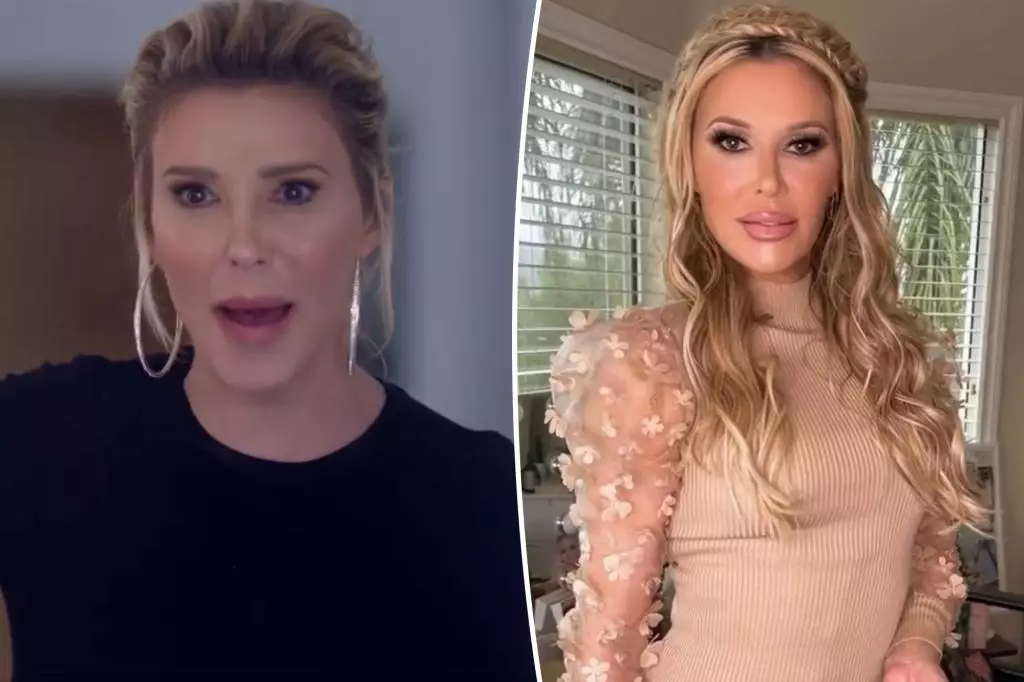In a dramatic unfolding of events in the realm of reality television, Brandi Glanville, known for her candid discussions and bold personality on “The Real Housewives of Beverly Hills,” recently leveled serious accusations against Andy Cohen, the influential host of “Watch What Happens Live.” Glanville claimed that her representation cut ties with her, suggesting that the legal counsel she once relied upon no longer considered her case against Bravo worth pursuing. This development comes in the wake of Glanville’s allegations of sexual harassment toward Cohen, raising questions about power dynamics and accountability within the entertainment industry.
The former reality star took to social media to convey her frustrations, stating, “My ‘lawyers’ have decided I now don’t have a case and cut ties with me,” adding fuel to the speculation regarding the legitimacy of her claims. She even hinted at potential coercion, suggesting her legal team may have been “paid off.” Such proclamations reveal a frustrating crossroads for Glanville—a sense of betrayal at a moment when she is seeking justice and validation.
Glanville’s legal counsel had previously sent a letter to NBC and its affiliates outlining the claims against Cohen, asserting that Glanville was subjected to sexually inappropriate comments via a video message. The contention is particularly troubling given Cohen’s prominent position within the Bravo network, which raises serious concerns about the abuses of power that can allow such conduct to go unchecked. The letter quotes allegations that Cohen expressed sexual desires while inebriated, creating an uncomfortable atmosphere for Glanville, who had been under his professional influence at the time.
These revelations have sparked discussions reminiscent of abuse scandals involving other high-profile industry figures, such as Matt Lauer, where the focus remained on protecting reputations and profits over individual well-being. The notion that Glanville felt “trapped” and “disgusted” speaks volumes about the climate within which many navigate their careers in reality television.
Cohen’s Response and Industry Reactions
Andy Cohen countered Glanville’s allegations by labeling the remarks as an “inappropriate joke,” indicating that humor was intended in the interaction. However, such explanations often blur the lines of acceptable workplace behavior. Cohen claimed it was a mutual jest shared among friends, specifically referencing fellow reality star Kate Chastain. Yet, acknowledging that the joke was “totally inappropriate” suggests a recognition of the potential harms such interactions can inflict, especially in a professional context where power imbalances exist.
Even amid these serious charges and subsequent denials, the entertainment industry has shown a pattern of downplaying allegations, often allowing influential figures to maintain their status while victims remain sidelined. Cohen’s apology, though an essential step, leaves many questions unanswered about accountability and the structures in place that either support or silence victims.
Glanville’s ensuing distress post-filming is perhaps equally telling. In recent months, she has been vocal about her struggles, citing stress effects in the form of physical ailments—an issue underpublicized in the world of reality television. Her assertion, “Stress will kill you,” underscores the personal toll that constant public scrutiny, along with unaddressed workplace issues, can enact on individuals.
Moreover, the subsequent allegations made by Caroline Manzo against Glanville herself illustrate a complex web of interactions within the franchise, where accusations can ricochet and complicate public perceptions. Glanville’s vehement denial of the claims made against her further highlights the often tumultuous nature of relationships within the reality television landscape.
In the wake of these intense events, it becomes painfully clear that while reality TV promises fame and fortune, it often comes with an emotional and psychological cost that can leave scars. The ongoing saga between Glanville and Cohen serves as a reminder of the need for thorough dialogue around consent, power dynamics, and the structures within the entertainment industry that dictate how such issues are addressed—or ignored altogether.

